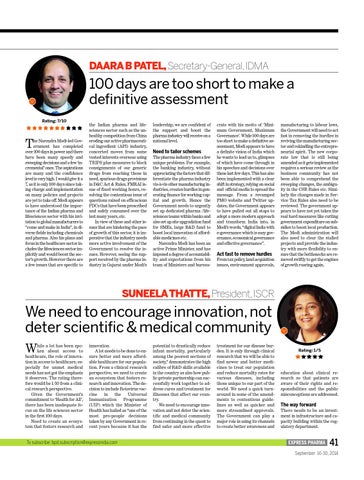DAARAB PATEL,Secretary-General, IDMA
100 days are too short to make a definitive assessment Rating: 7/10
T
he Narendra Modi-led Government has completed over 100 days in power and there have been many speedy and sweeping decisions and a few ‘incremental’ ones. The aspirations are many and the confidence level is very high. I would give it a 7, as it is only 100 days since taking charge and implementation on many policies and projects are yet to take off. Modi appears to have understood the importance of the Indian pharma and lifesciences sector with his invitation to global manufacturers to “come and make in India”, in diverse fields including chemicals and pharma. Also his plans and focus in the healthcare sector includes the lifesciences sector implicitly and would boost the sector’s growth. However there are a few issues that are specific to
the Indian pharma and lifesciences sector such as the unhealthy competition from China eroding our active pharmaceutical ingredient (API) industry, concerted moves from some vested interests overseas using TRIPS plus measures to block consignments of our generic drugs from reaching those in need, spurious drugs provisions in D&C Act & Rules, FMRAI issue of fixed working hours, resolving the contentious issue of questions raised on efficacious FDCs that have been prescribed and safely consumed over the last many years, etc. In view of these and other issues that are hindering the pace of growth of this sector, it is imperative that the industry needs more active involvement of the Government to resolve the issues. However, seeing the support received by the pharma industry in Gujarat under Modi’s
leadership, we are confident of the support and boost the pharma industry will receive on a national level.
Need to tailor schemes The pharma industry faces a few unique problems. For example, the banking industry, without appreciating the factors that differentiate the pharma industry vis-à-vis other manufacturing industries, creates hurdles in generating finance for working capital and growth. Hence the Government needs to urgently set up dedicated pharma /lifesciences teams within banks and also set up site upgradation fund for SMEs, large R&D fund to boost local innovation of affordable medicines etc. Narendra Modi has been an active Prime Minister, and has imposed a degree of accountability and expectations from his team of Ministers and bureau-
crats with his motto of ‘Minimum Government, Maximum Governance’. While 100 days are too short to make a definitive assessment, Modi appears to have a definite vision of India which he wants to lead us to, glimpses of which have come through in his speeches and decisions over these last few days. This has also been implemented with a clear shift in strategy, relying on social and official media to spread the message. From a revamped PMO website and Twitter updates, the Government appears to have pulled out all stops to adopt a more modern approach and transform India into, in Modi’s words, “digital India with e-governance which is easy governance, economical governance and effective governance”.
Act fast to remove hurdles From tax policy, land acquisition issues, environment approvals,
manufacturing to labour laws, the Government will need to act fast in removing the hurdles in reviving the manufacturing sector and rekindling the entrepreneurial spirit. The new corporate law that is still being amended as it gets implemented requires a serious review as the business community has not been able to comprehend the sweeping changes, the ambiguity in the CSR Rules etc. Similarly the changes made in Service Tax Rules also need to be reviewed. The government appears to have not yet taken the real hard measures like cutting government expenditure on subsidies to boost local production. The Modi administration will also need to clear the stalled projects and provide the industry with more flexibility to ensure that the bottlenecks are removed swiftly to get the engines of growth roaring again.
SUNEELATHATTE,President, ISCR
We need to encourage innovation, not deter scientific & medical community W
hile a lot has been spoken about access to healthcare, the role of innovation in access to healthcare, especially for unmet medical needs has not got the emphasis it deserves. The rating therefore would be 1/10 from a clinical research perspective. Given the Government’s commitment to ‘Health for All’, there has been inadequate focus on the life sciences sector in the first 100 days. Need to create an ecosystem that fosters research and
innovation A lot needs to be done to ensure better and more affordable healthcare for our population. From a clinical research perspective, we need to create an ecosystem that fosters research and innovation. The decision to include Rotavirus vaccine in the Universal Immunisation Programme (UIP) which the Minister of Health has hailed as “one of the most pro-people decisions taken by any Government in recent years because it has the
To subscribe: bpd.subscription@expressindia.com
potential to drastically reduce infant mortality, particularly among the poorest sections of society,” demonstrates the high calibre of R&D skills available in the country as also how public-private partnership can successfully work together to address cures and treatment for illnesses that affect our country. We need to encourage innovation and not deter the scientific and medical community from continuing in the quest to find safer and more effective
treatment for our disease burden. It is only through clinical research that we will be able to find newer and better medicines to treat our population and reduce mortality rates for various diseases, including those unique to our part of the world. We need a quick turnaround in some of the amendments to contentious guidelines as well as quicker and more streamlined approvals. The Government can play a major role in using its channels to create better awareness and
Rating: 1/5
education about clinical research so that patients are aware of their rights and responsibilities and the public misconceptions are addressed.
The way forward There needs to be an investment in infrastructure and capacity building within the regulatory department.
EXPRESS PHARMA
41
September 16-30, 2014
